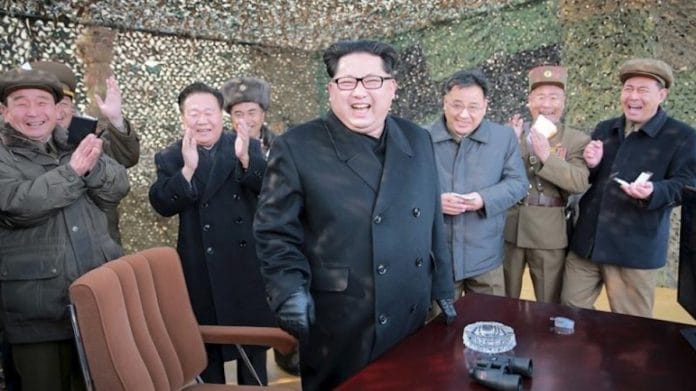Kim Jong-un should be trusted and given the benefit of doubt to “dismantle the Cold War framework on the Korean Peninsula and throughout Northeast Asia.” Anti-Semitism might not actually be on the rise in Europe, and the international community is finally on the long road to nuclear disarmament.
To abandon or not to abandon?
Donald Trump will have to decide whether or not to abandon the Iran nuclear deal by May 12. “This is crunch time for the global nuclear order,” writes Ramesh Thakur in Project Syndicate.
“Multilateral agreements are always prone to gaps in application; the international non-proliferation regime is no different. For example, while neither Israel nor India have signed the NPT, both states are considered responsible members of the nuclear-weapons club.”
“If the global non-proliferation regime is to remain viable, the competing visions reflected in the NPT and the ban treaty must be reconciled. For that to happen, the international community needs to agree on a strategy to achieve an international order in which the reduction of nuclear stockpiles reinforces, rather than jeopardizes, regional and global security.”
“By the end of this week, the fate of the Iran nuclear deal will be clear; Trump’s refusal to recertify it would very likely signal its demise. But, regardless of what becomes of Iran’s nuclear program, or of North Korea’s for that matter, a weakening of the NPT – the bedrock of the global nuclear order for a half-century – represents the biggest threat of all.”
Winds of change
“The upcoming historic meeting between North Korean leader Kim Jong Un and U.S. President Donald Trump is sure to mark a turning point in the destiny of the Korean Peninsula. Although there are concerns over all the uncertainties, I harbor cautious optimism for the road ahead because I discern a sincerity in Kim. To test that sincerity, we need to give Kim the benefit of the doubt,” writes the former South Korean envoy to the United States, Hong Seok-Hyun, in the Washington Post.
“Kim’s change of heart likely resulted from his realization that as long as he holds on to nuclear weapons, economic development will be difficult. Just last month, Kim shifted policy from simultaneously pursuing nuclear weapons and economic development to focusing solely on advancing the economy. North Koreans are experimenting with the market economy: There are hundreds of informal markets known as “jangmadang,” and there are millions of mobile phones in circulation. Kim may have come to the conclusion that it will not be possible to suppress the desires and grievances of his people if the current “maximum pressure” campaign against North Korea continues. Kim’s aspiration for Chinese and Vietnamese-style economic growth could have been another factor,” he writes.
“In the Panmunjom Declaration, Moon and Kim confirmed their common goal of realizing a “nuclear-free Korean Peninsula,” but there could be a catch in that phrase. The phrase could include the withdrawal of U.S. Forces Korea and their ability to mobilize nuclear weapons here, or perhaps a ban on dispatching strategic assets to the Korean Peninsula, or the dismantlement of the nuclear umbrella for South Korea. Overall, it looks as if the key agenda of denuclearization was overshadowed by the push to promote inter-Korean relations. With the promise of the end of inter-Korean war, Kim has, in effect, neutralized the U.S. military option,” he writes.
It’s not as bad as we think
Has a wave of anti-Semitism truly taken over Europe? The Economist suggests that this is not the case, and it might be a solace.
“It was part of a busy month for European anti-Semitism. On April 8th Viktor Orban, prime minister of Hungary, won re-election after a campaign in which he demonised George Soros, a Jewish financier and philanthropist, as a shadowy billionaire secretly controlling the opposition for nefarious purposes. In Berlin on April 17th, a young Israeli was assaulted while wearing a kippah, or Jewish skullcap; the alleged attacker was a Syrian refugee.”
Similarly, “in Poland on April 17th Ruch Narodowy, a far-right party, filed a complaint against Reuven Rivlin, the president of Israel, for allegedly violating a new law against saying that the Polish nation bears any guilt for the Holocaust.” A French newspaper published an open letter denouncing “a new anti-Semitism” among Muslims. “Meanwhile in Britain, the Labour Party continued a long-running row over anti-Semitism in its ranks.”
“Many people worry that anti-Semitism is growing in Europe,” the Economist notes. But there is no hard data to support this fact in most countries in Europe. “Antagonism towards Israel often spills over into anti-Semitism, particularly on the political left. And European Muslims are much more likely to have anti-Semitic beliefs than non-Muslims. But it is debatable whether this “new anti-Semitism” has supplanted the traditional variety.”
“Indeed, in most countries, anti-Semitism rises or falls in concert with nationalism and identity politics,” the Economist writes.






